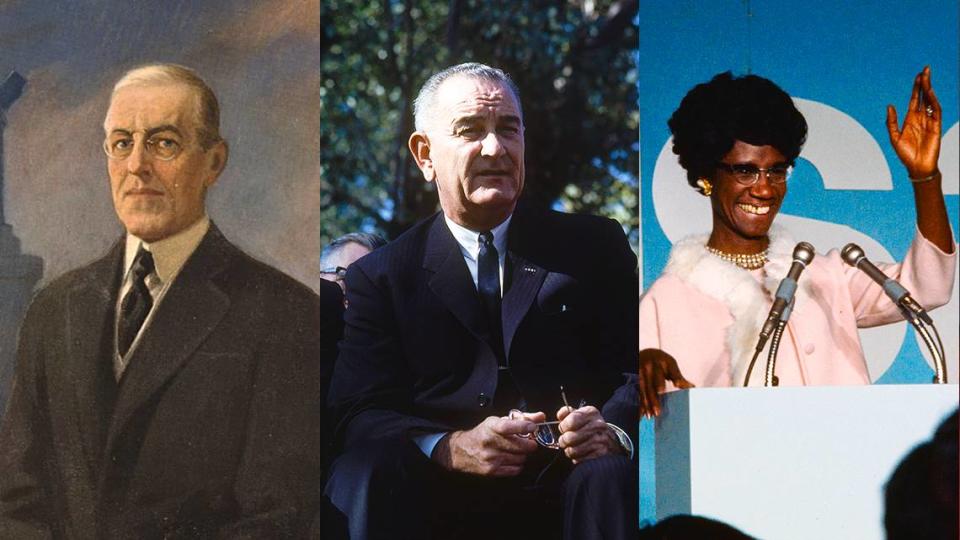‘Unprecedented times’? We’ve seen worse - and it’s no reason for bad decisions | Opinion
- Oops!Something went wrong.Please try again later.
- Oops!Something went wrong.Please try again later.
- Oops!Something went wrong.Please try again later.
We are not in unprecedented times.
There’s a lot going on these days. An assassination attempt on a former and perhaps future president. An ailing president dropping his reelection effort and his party’s response. Domestic unrest over events overseas.
The impulse to say this is the worst we’ve ever seen, or we’re in uncharted waters, is strong.
So many things are labeled unprecedented. A lapse in security that allowed a candidate for president to be shot? Unprecedented! An elderly man with diminished capacity serving as president while his closest aides hide details from the public? Unprecedented! A sitting president withdrawing from his reelection campaign? Unprecedented! A man with authoritarian impulses running for president? Unprecedented!
The kindest interpretation is that we’re collectively ignorant of our own brief history. Kamala Harris may yet be the first Black woman to win the presidential nomination for the Democratic Party — but why forget Shirley Chisholm, the first Black woman elected to Congress, so quickly?
The claims about Joe Biden’s infirmity and Donald Trump’s motivations might not be true — but if they are true, they’re not unprecedented.
Woodrow Wilson suffered his most severe stroke in October 1919, after several other prior strokes, whose effects he denied. This one incapacitated him, leading a White House staff member to recall, “There was not a sign of life.” Wilson’s wife Edith and his personal physician covered for him over the last 17 months of his second term.
Incumbent President Lyndon Johnson ended his reelection campaign in 1968 as an unpopular war abroad and riots here at home eroded support within his party. He dropped out of the race on March 31. Harry Truman dropped his reelection bid in March 1952 after losing the New Hampshire primary.
As for authoritarians, we’ve seen that before, too. Abraham Lincoln suspended habeas corpus, the right to appear before a judge after arrest. Wilson was an opponent of free speech during World War I, threatening “stern repression” for disloyalty and championing legislation to establish punishments for, among other things, disloyalty to the government, the military and ironically, the U.S. Constitution. Franklin Roosevelt infamously placed Japanese Americans in internment camps.
Perhaps the least unprecedented blast from the past is sensationalist media reporting. In 1898, William Randolph Hearst and Joseph Pulitzer employed creative storytelling about the Spanish-American War to help sell newspapers at home. When one of Hearst’s reporters wrote to him from Cuba saying that all is quiet and, “There will be no war,” Hearst is alleged to have responded, “You furnish the pictures and I’ll furnish the war.”
As Ecclesiastes instructs us, “Nothing is new under the sun! Even the thing of which we say, ‘See, this is new!’ has already existed in the ages that preceded us.”
But beyond a sort of malfunctioning rearview mirror, there’s a more ominous reason to be wary of people labeling challenges as unprecedented: It gives them permission to propose unprecedented solutions. President Barack Obama’s chief of staff Rahm Emanuel famously said: “You never want a serious crisis to go to waste. And what I mean by that is an opportunity to do things that you think you could not do before.”
Even if a situation is truly unparallelled, we should resist overreach. The COVID-19 pandemic was considered unprecedented, and so too were the solutions: Governments at the federal, state and local levels all granted themselves vast new powers. The consequences, such as inflation and learning losses due to school closures, will be with us for years.
Lincoln, Wilson and Roosevelt probably felt their unconstitutional and civil rights-violating power grabs were justified by the unprecedented situations they faced. Their solutions, however, were wrong.
Regardless of the issue or the era, the response to unprecedented events is directionally the same: more power and authority for a small group of people at the top, taking away decisions we’ve been making for ourselves.
If you hear someone arguing that we’re in unprecedented times, listen carefully. Not only are they probably wrong, but they may be goading you to sign off on a big bad idea.
Patrick Tuohey is co-founder of Better Cities Project, a 501(c)(3) nonprofit focused on municipal policy solutions, and a senior fellow at the Show-Me Institute, a 501(c)(3) nonprofit dedicated to Missouri state policy work.


